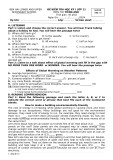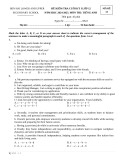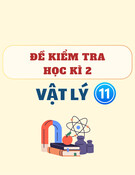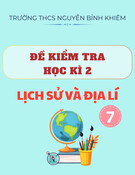
SỞ GD & ĐT TỈNH ĐIỆN BIÊN
TRƯỜNG THCS VÀ THPT QUÀI TỞ
ĐỀ KIỂM TRA CUỐI HỌC KỲ I
MÔN TIẾNG ANH 12
NĂM HỌC 2022 - 2023
Thời gian: 60 phút không kể thời gian phát đề
ĐỀ CHÍNH THỨC
(Đề có 5 trang)
Họ tên : .........................................................Lớp : 12 C…...
Mã đề 12
Điểm Lời phê của thầy giáo, cô giáo
1 2 3 4 5 6 7 8 9 10 11 12 13 14 15 16 17 18 19 20 21 22 23 24 25
ⒶⒶⒶⒶⒶⒶⒶⒶⒶⒶⒶⒶⒶⒶⒶⒶⒶⒶⒶⒶⒶⒶⒶⒶⒶ
ⒷⒷⒷⒷⒷⒷⒷⒷⒷⒷⒷⒷⒷⒷⒷⒷⒷⒷⒷⒷⒷⒷⒷⒷⒷ
ⒸⒸⒸⒸⒸⒸⒸⒸⒸⒸⒸⒸⒸⒸⒸⒸⒸⒸⒸⒸⒸⒸⒸⒸⒸ
ⒹⒹⒹⒹⒹⒹⒹⒹⒹⒹⒹⒹⒹⒹⒹⒹⒹⒹⒹⒹⒹⒹⒹⒹⒹ
26 27 28 29 30 31 32 33 34 35 36 37 38 39 40 41 42 43 44 45 46 47 48 49 50
ⒶⒶⒶⒶⒶⒶⒶⒶⒶⒶⒶⒶⒶⒶⒶⒶⒶⒶⒶⒶⒶⒶⒶⒶⒶ
ⒷⒷⒷⒷⒷⒷⒷⒷⒷⒷⒷⒷⒷⒷⒷⒷⒷⒷⒷⒷⒷⒷⒷⒷⒷ
ⒸⒸⒸⒸⒸⒸⒸⒸⒸⒸⒸⒸⒸⒸⒸⒸⒸⒸⒸⒸⒸⒸⒸⒸⒸ
ⒹⒹⒹⒹⒹⒹⒹⒹⒹⒹⒹⒹⒹⒹⒹⒹⒹⒹⒹⒹⒹⒹⒹⒹⒹ
Mark the letter A, B, C or D to indicate the word whose underlined part differs from the
other three in pronunciation in each of the following questions.
Question 1: A. cooksB. students C. delights D. things
Question 2: A. travelled B. wanted C. cleaned D. played
Question 3: A. thank B. those C. this D. these
Mark the letter A, B, C or D to indicate the word that differs from the other three in the
position of primary stress in each of the following questions.
Question 4: A. alive B. careful C. happy D. nervous
Question 5: A. customer B. festival C. suggestion D. capital
Mark the letter A, B, C or D to indicate the underlined part that needs correction in each of
the following question.
Question 6: The trees who have the beautiful flowers are planted near the gate of the garden.
A B C D
Question 7: What would you do if you win a million dollars?
A B C D
Question 8: The National Curriculum is set in the government.
A B C D
Question 9: The telephone was invent by Alexander Graham Bell.
A B C D
Trang 1/5 - Mã đề 121








































